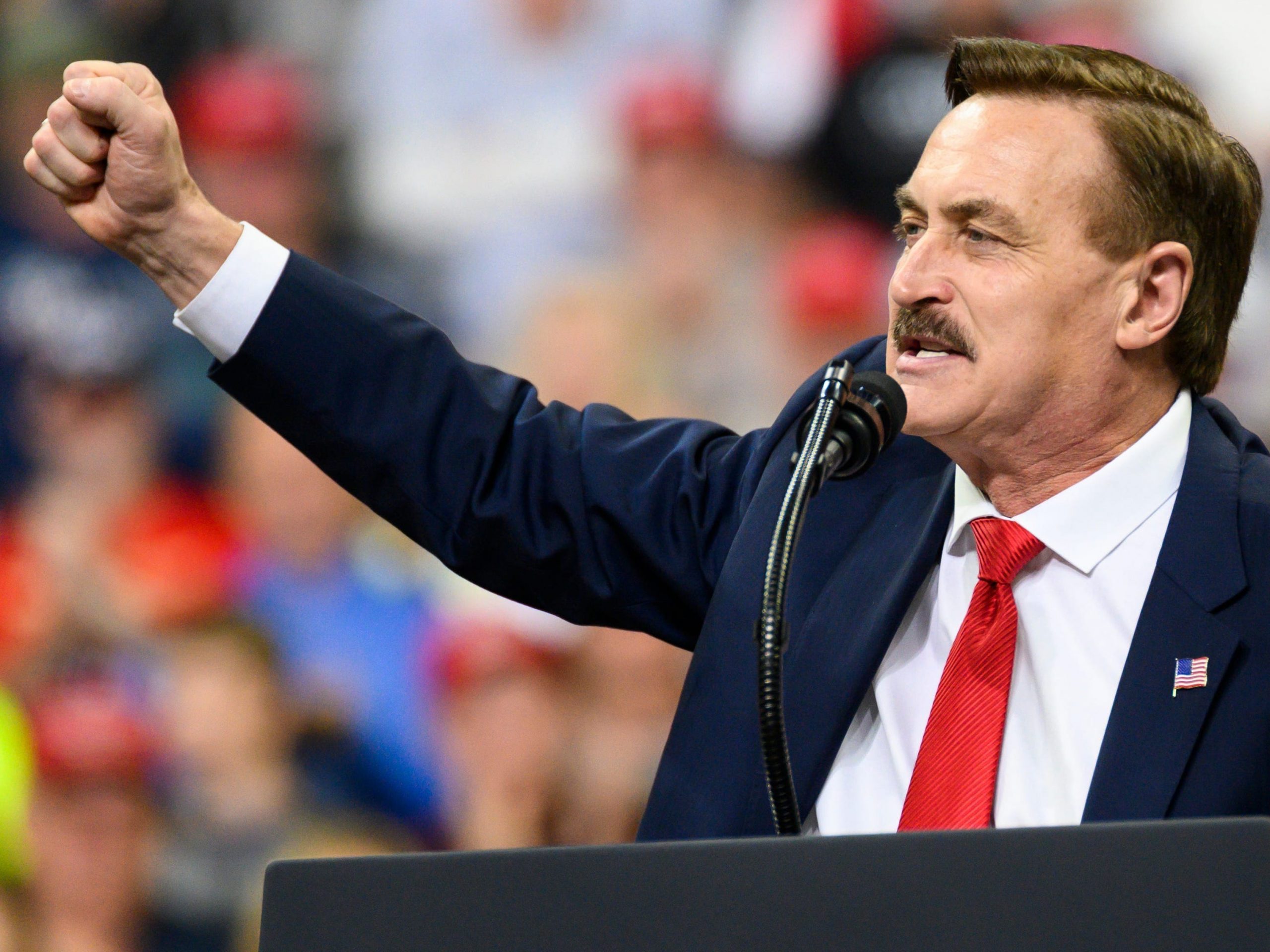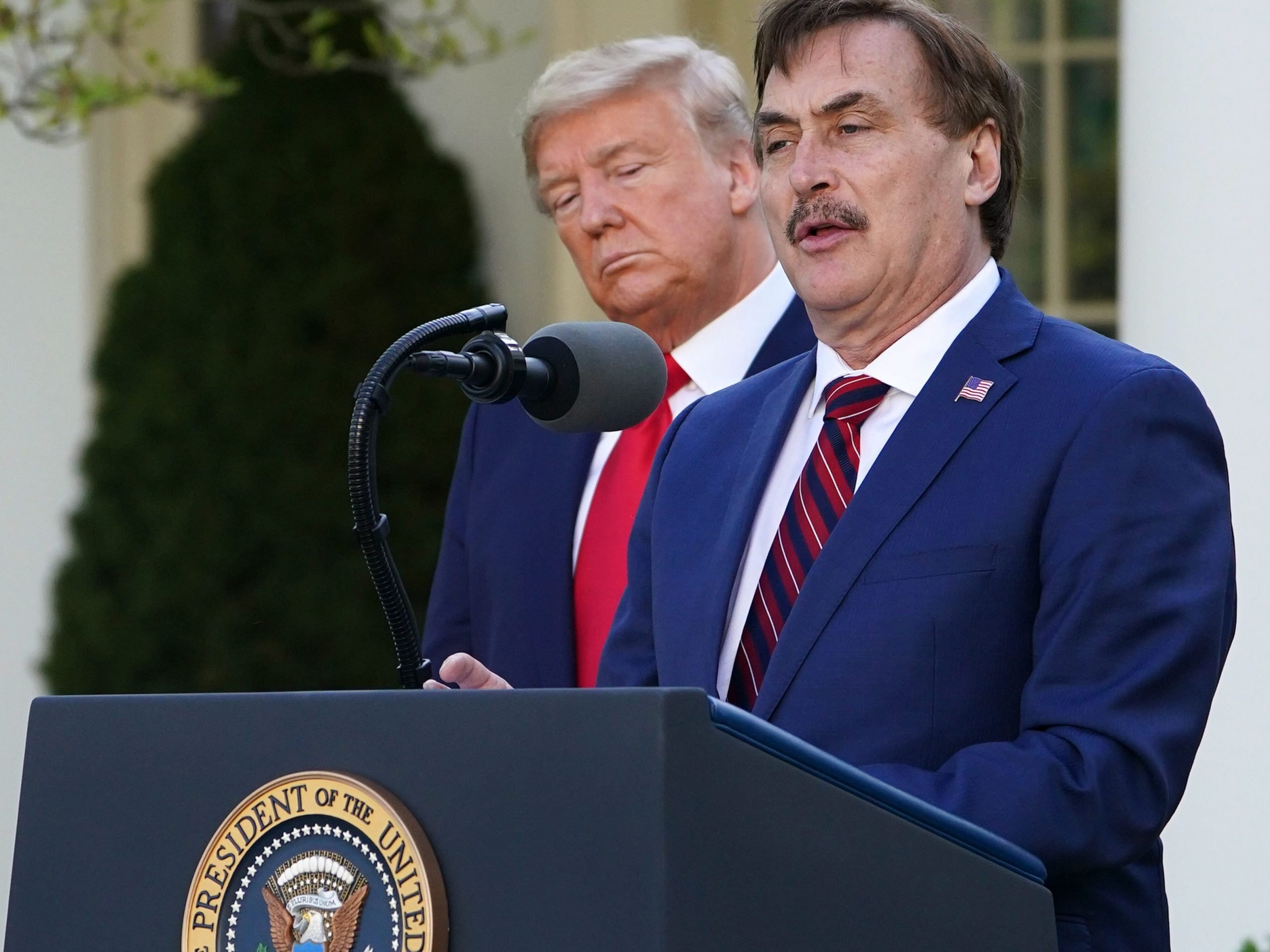
Stephen Maturen/Getty Images
- MyPillow is massively ramping up its spending on Facebook ads, data company Pathmatics told Insider.
- Its Facebook ad spending spikes whenever there's bad press about Mike Lindell, data shows.
- Lindell has openly criticized Facebook and said he plans to launch his own social-media site.
- See more stories on Insider's business page.
MyPillow's spending on Facebook ads spikes every time there's bad press around its controversial founder Mike Lindell, according to data shared with Insider.
Lindell has been blocked from Twitter, sued by Dominion, and had his products pulled by retailers all in the space of a few months – and MyPillow boosted its Facebook ad spending each time, the data shows.
The pillow company has spent an estimated $3.6 million on Facebook ads since January alone, ad-data company Pathmatics told Insider.
The company relies predominantly on infomercials, starring Lindell himself, to drive sales. He told Insider's Kate Taylor that he run ads on more than 5,000 channels and 500 radio stations that span the political spectrum and that the company reaches "everyone."
He told Taylor Facebook, Twitter, and YouTube are destroying businesses. He also has lambasted all three social-media sites in interviews after they deleted his posts that falsely claimed voting machines switched votes from Donald Trump to Joe Biden during the 2020 presidential election.
Despite his comments about social-media sites, data from Pathmatics shows that MyPillow has massively ramped up its Facebook ad spending. Its $3.6 million Facebook ad spend between January and mid-March alone is a huge increase on 2020, when it spent an estimated $2.3 million on Facebook ads over the course of the whole year. This, in turn, was more than double what it had spent in 2019.
This also greatly surpasses how much MyPillow spends advertising on other websites, too. Pathmatics estimates the company spent 93% of its 2020 digital ad spend on Facebook.
Its spending on Google's ad network dropped to $0 in March after spending around $45,000 between January 2020 and early March 2021, estimates from Pathmatics show. Lindell has said in interviews that he spent "tens of thousands of dollars" buying ads on Google, but that the search engine had "canceled" him.
MyPillow's Facebook ad spending spikes when there's bad press about Lindell
In January, retailers began pulling MyPillow's products after customers said they would boycott the brand over Lindell's voter-fraud claims. Following the news, MyPillow more than quadrupled its daily Facebook ad spend from $4,500 on January 15 to $175,000 on January 21, according to estimates from Pathmatics.
In February, Dominion Voting Systems filed a $1.3 billion defamation lawsuit against both Lindell and MyPillow, accusing him of "knowingly [lying] about Dominion to sell more pillows." After this, MyPillow more than tripled its daily Facebook ad spending to $94,000, estimates from Pathmatics show.
Twitter permanently banned Lindell's account in January and suspended MyPillow's a week later after Lindell falsely accused Twitter's CEO, Jack Dorsey, of being involved in fraud during the 2020 election. Pathmatics estimates that after Lindell was banned, MyPillow more than doubled its Facebook ad spending to $154,000 overnight.
Spending also spiked in both 2020 and 2021 ahead of his appearance at CPAC, Pathmatics said. The company reached its 2020 digital ad spend peak at the beginning of April, after Lindell appeared at Trump's coronavirus task force meeting.

MANDEL NGAN/AFP via Getty Images
And in July 2020, when companies including Starbucks, Unilever, and Ford halted Facebook ads for a month after the platform allowed posts in which then-President Donald Trump called Black Lives Matter protesters "thugs," MyPillow actually increased its Facebook ad spending by more than 60% from the previous month, according to estimates from Pathmatics.
Lindell told Insider's Taylor that each MyPillow ad either breaks even or makes money, regardless of any controversies he is embroiled in at the time.
Data from Google Trends show that searches for "MyPillow" peak, not when seasonal searches for "bedding" are high, but when Lindell is in the news.
When Lindell is in the news, interest in the brand grows, and so it may invest in online ads to capitalize on this increased interest, professor at Northwestern's Kellogg School of Management, told Insider.
"MyPillow is recognizing that bad press is still press and is taking advantage of the energy, no matter the sentiment," Matt Klein, a cultural researcher and consultant, told Insider. "Lindell's divisiveness is attractive to some."
"So when there's a press hit, negative or positive, he becomes top of mind again for those consumers," Klein added.
Lindell plans to launch his own social-media site
But as MyPillow has ramped up its Facebook ad spending, Lindell has been secretly creating his own social-media platform over the last four year.
Lindell told Insider's Natasha Dailey that the social-media site, which is called Vocl and due to launch over the next month, will be a cross between Twitter and YouTube.
In a podcast on Monday, he said Vocl would be the "biggest platform in history, safest platform ever."
Lindell has been open about his problems with other social-media sites, notably Twitter, Facebook, and YouTube, which have flagged or removed content where he peddled voter-fraud theories.
Lindell, who is planning to be the site's CEO, told Dailey he didn't have any prospective investors and declined to say how much money he invested in Vocl. It is unknown how much - if at all - he plans to use the site to advertise his MyPillow brand.
Despite MyPillow increasing its digital advertising, though, the company has given no indication that its infamous infomercials will stop any time soon.